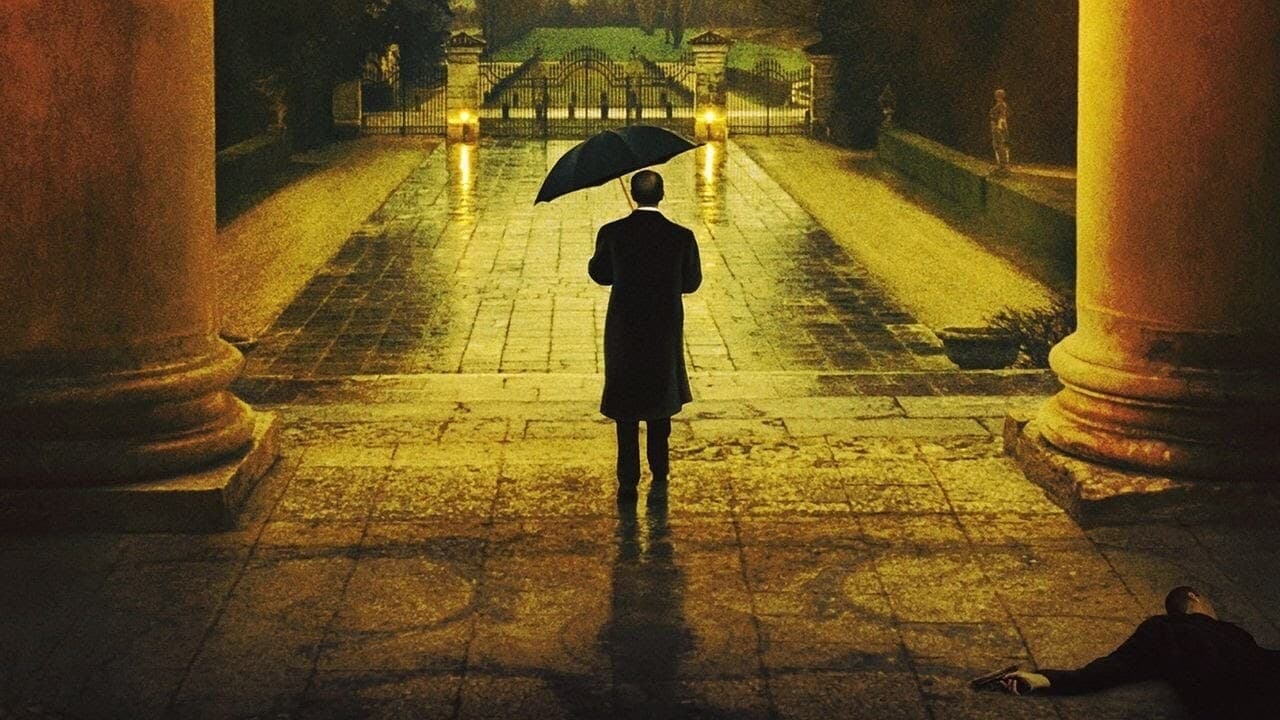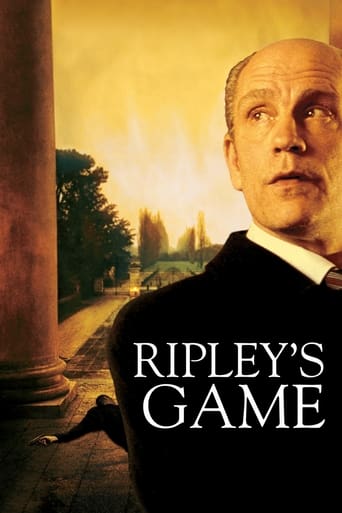

The Tom Ripley character is one of the great characters of all time. In all the movies, Ripley is a complete sociopath...a man with no sense of conscience and who is willing to do anything to get what he wants in life. The's such a great character because he's so incredibly believable...a textbook example of the antisocial personality. While some incarnations of Ripley were quite gorgeous (especially Alaine Delon in the first Ripley film), this one features John Malkovich who brings his own take on the menacing man. In this case, he looks so incredibly ordinary...yet is a man who kills with zero remorse! The film begins with Ripley committing a brutal murder. However, much of the movie is not about Ripley the assassin but Ripley the master manipulator. Years pass and Ripley notices a young, cocky Jonathan (Dougray Scott) making fun of him at a party. Later, Ripley learns this same man is dying from cancer...and he uses this information to eventually turn this genuinely decent man into a killer...almost as if he's some science fair project! What's next? See the film.I must warn you that this film has some very brutal and vivid murders....and it's NOT a kid's movie!! But it also is very well written, acted and is very engaging and a savvy look at just what sociopaths are capable of doing.
... View MoreThe Netflix DVD projected a story that was virtually ludicrous at times, sloppily directed and relied on the most hackneyed of hack 'writing'; coincidences happening at crucial moments. A maximum of 1,000 words (plus my own valuable time) will necessitate a less lengthy critique of this heavily flawed film. 1. Since the art dealer at the start of the film accepts Riley's comment that the 'forgery' will still be sold by the dealer for x amount of dollars then why any artifice at all. The two parties are colluding on a scam. 2. After Riley leaves the dealer's place he gives Reeves their entire profit of $400,000. Why does he do that? To sever their collaboration! Story suggestion: Why not take the $200 grand and then tell him you're not doing business with him anymore. 3. Ripley, owning a magnificent palace? His scams must be extraordinarily successful to afford that lifestyle (and with only one servant, a cook, to look after the place? How about a staff of 15?) 4. In an awkwardly staged gotcha scene Jonathan goes on and on as he puts down Ripley. Not one person in a presumed group of friends alerts him to his gaffe? But more interesting is what Jonathan is griping about.....Ripley's lack of taste! Was the writer smoking crack? Having a classic bourgeois talking about the 'taste' of a man who plays classical music on the harpsichord, loves art, loves good food, loves a good looking classical musician who is crazy about him? Errrrrh, who is the tasteless person here? 5. Reeves somehow traces and finds the almost compulsively thoughtful, careful, thorough plan-making Ripley and gets him to accept a preposterous story about how he can't murder a rival because suspicion will be attached to him. That particular crowd of Berlin criminals is a large one, probably known to the police and Reeves isn't clever enough to create an alibi and hire some goon to get it done? He wants Ripley to do it. Why should Ripley accommodate him? Given R.'s m.o. he would kill Reeves to get rid of him. But then the pseudo-sociopathic (I'll get back to this later) Ripley, stung beyond belief by having been put down publicly at the party by J., finds out somehow that J. is terminally ill and 'needs the money' and passes his name on to Reeves as someone who could be manipulated into becoming a hit man. What?! J. looks like a sick man (though he seems not to have any physical impairments as the movie goes on) and though his work place in Milan is spacious and looks like it's successful, it doesn't enter his mind to move to a humbler more affordable rental. And speaking of his finances, though his home is not palatial it's quite grand. How about moving to a smaller place and, by the way, stop throwing expensive parties. The comments about J. in this section are small potatoes compared to my main thought: I could never for a moment accept that the personality created on the screen was someone who would make the leap from being a decent husband and father into a hit man murderer. 6. Ripley is not a true sociopath but a pseudo-sociopath because he suddenly develops a conscience and/or 'feelings' about Jonathan. Sociopaths don't pack the gear for this kind of behavior. (Suddenly it's a black humor buddy movie?) 7. I'm starting to tire over this review since there's so much more to say. I'll end therefore with one example of a director's (or script supervisor's) sloppiness: Reeves, with 3 or 4 hit man in the same locale after him, goes into a rage when Ripley cuts him loose. Reeves starts shaking the bars of the gate outside of the property's entrance. Fit to kill, he can't figure out a way of accessing the property. But moments later Jonathan somehow does and rides his bicycle to the palace. Then, later still, J.'s wife drives up to the house, somehow getting the gates to open and close behind her. Then for the unbelievable coincidences: Here's but one. The hit men after Ripley are clever enough to breech the gate and in daylight are spotted approaching the building. This occurs because Ripley 'happens' to be looking out the right window and can see them. Later, as J. is about to get his brains blown out Ripley just again (what luck the man has!) is at the right door at the right time to prevent this from happening and shoots the hit man. I'll conclude now. I understand that the original director walked off the project early on and that John Malkovitch took over directing. This explains much of what went wrong. And finally, it's almost always rotten pictures that go straight to DVD because the producers believe they have a bomb on their hands.....and that's why Ripley's Game suffered that fate.
... View MoreJohn Malkovich plays the sort of character you wish him to play in all movies. A calm, collective, emotionless director of intensity and intelligence. He seems to have such a professional balance of effeminate attitude; contrasted to his very manly appeal. It's easy to say Malkovich is what really makes this film worth watching.Without John and imagining anyone else this movie would ride the fine line of a B-Listed movie, but with John coming out as an older, wiser, and hardened Tom Ripley the movie is instantly worth shelving in your collection. I wouldn't say it's a classic, but it's a classic Malkovich.The film basically takes place many years, probably decades and decades after the original: The Talented Mister Ripley and Ripley appears to be completely different. Complete evolved and trained in what sort of monster he had become. He lives in Europe living the high life as a black market art dealer and owns a beautiful plot of land with a mansion with a beautiful and talented wife to boot. A wife who even knows his business makes you realize how amazing Tom Ripley is. To be a thug-con artist and swing an amazingly talented wife at the same time.The plot starts rolling with Tom Ripley being publicly insulted at a neighbor's dinner party. The subject being that "he has no taste". Tom rolls with it and ignores it for the most part but tracks a laughable revenge by setting him up with a mobster who coerces him (the insulter of Ripley) to become a one time hit man.Things spiral out of control from there. Or at least out of control for everyone, but Ripley, who seems to just be calm, collective, and uncaring of all the events surrounding him. This film doesn't have the greatest cast or the best plot. It's not that that makes this film worth watching. It's the superior class Malkovich brings to the stage/film. If you like Malkovich and/or liked the original film, you will want to see this.
... View MoreThe talented Mr. Ripley is in retirement in Europre; his last job that he carried out before retirement is shown early in the movie when the very elegant, suave, etc. Mr. Ripley turns and commits a very foul crime that shows his inner ruthlessness. The purpose of this scene is to introduce his cohort in crime as well as remind the viewer what sort of man Mr. Ripley is and the people he deals with.Years past and Ripley is seemingly absorbed into proper society; though there are rumors about his past. Nonetheless life seems to be going well for Mr. Ripley; living in a fashionable Italian villa as well as being in love with a world class musician. Then, his former associate in crime arrives unexpectedly at the villa. As unwelcome as this associate is Ripley does not throw him out immediately; that would be too rude even in private life. The visit is, unfortunately, not a personal one. Rather, it is business. The associate has some problems in Berlin with the new Russian crime bosses. He needs to find somebody who will take out one of these bottom dwellers. Does Ripley know a good hit man for the job? Ripley mulls it over and determines that the best hit man for a job like this would be somebody who has never done this sort of stuff before. Can an innocent man be persuaded to do this? This is not an easy question in the movies or in real life. In any civilized society murder is condemned harshly. Even if the victim of a murder is a low life him/herself the crime is treated as murder. Are there any circumstances where killing is allowed? Yes, there are some killings allowed such as on a battlefield during war. But, that is state sanctioned. Shooting somebody in a mob type killing is hardly allowed- or is it?? Can it be justified? But, even if a "suitable" victim is found does that give anybody the right to shoot them?? And, even if the person is deemed "suitable" for elimination by some standard- will the killing end with this individual or will there be retaliation? And, if there is, who can one call for help?? Does the end justify the means? This movie asks the question of whether a non-criminal can be induced to commit murder. It also asks other questions; some of them quite disturbing to even contemplate. In a way it is a continuation of movies that go back to "The Man who Shot Liberty Valence"; movies that question what ordinary people can do in extraordinary circumstances.Realistically I doubt that a man such as Tom Ripley even exists. He seems as improbable as James Bond. Yet, James Bond was (supposedly) modeled on some real life individuals. Such a man as Tom Ripley may actually be out there. If so, he (or they) will probably resemble the character John Malkovich portrays. It is a very good portrayal of a very complex person.
... View More